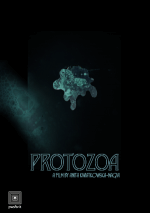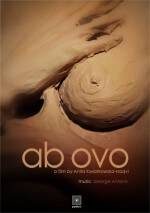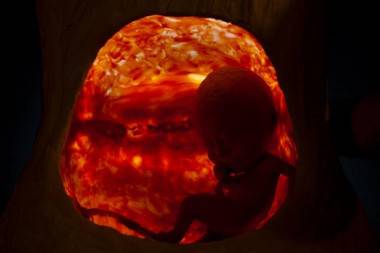Q&A with ‘Ab Ovo’ director Anita Kwiatkowska-Naqvi
Cracow-born Anita Kwiatkowska-Naqvi is a recent graduate of the Polish National Film, Television and Theatre School in Łódź. Having directed two prior shorts Protozoa (2010) and Carnalis (2012), her 2013 graduation film Ab Ovo has fared especially well, winning awards across the globe including Best Graduation Film at Annecy 2013 and the Grand Prix at Poznań‘s Animator Festival. The film, both visceral and hauntingly beautiful, is a semi-abstract interpretation of pregnancy and impending motherhood making tremendous use of superbly-detailed clay animation. Skwigly got in touch with Anita to find out more about her intriguing creative process.
Can you tell us a little about your background prior to making the film?
Before starting animation I studied Psychology. I wanted to become a neuroscientist and discover the fascinating human brain, but than I realized that the discovery process in science is so diluted, that you rarely feel the pleasure of it. In animation, the creative process itself is fascinating. When I understood that, I decided to study animation. Ab ovo was my third year project at Filmschool.
What is it about animation that appeals most to you as a filmmaker?
The possibility of total creation, everything that’s in your mind can be made real through animation.
What’s your preferred animation technique and why do you feel drawn to it?
I feel most comfortable with stop-motion, although I like to experiment with techniques. Frame by frame animation leaves a certain amount of freedom and lets you be creative and improvise during the animation process.
How was the experience of making your film at the Polish National Film, Television and Theatre School?
The strong part of the school are the people: the teachers and the students. Talking about the concept with fellow students, especially my cinematographer Leyla Comert, is what formed the film.
What would you say were your key visual influences for the film’s aesthetic?
My key visual influence comes from biology, I was fascinated with biology as early in life as my first memories go. Biology is full of interesting images and processes that deserve attention for their importance, usefulness or the mere beauty.
 Your short Protozoa depicts an usual, hypnotic world, almost as though viewed through a microscope. What production processes and materials were used to create this effect?
Your short Protozoa depicts an usual, hypnotic world, almost as though viewed through a microscope. What production processes and materials were used to create this effect?
It was stop motion animation of semi-transparent materials on glass, which was lit from beneath. The materials were starch cooked with water, toothpaste, hair styling gel and other rather non-conventional stuff. The scale was not small, although I keep trying to reduce the scale of the animation set, in my film Carnalis I used macro-photography, the set was tree centimetres big, and currently I am trying to use even stronger macro lenses and an actual microscope for animation.
Of all the aforementioned biological processes, the idea of procreation and birth seem to be present in all films, to varying degrees. Is this a particular subject of interest?
It is not procreation itself, but rather the life cycle, that fascinates me.
According to your website you’re also a psychology graduate, does this side of your life play a role in how you operate as a filmmaker?
It gives me some openness and self-awareness which is helpful, and a never-ending source of inspiration. On the other hand, knowledge sometimes interferes with the creative process. Psychology explains human behaviour. To make films you need to forget those explanations and treat human behaviour as a mystery, discover it from another perspective. Rational and scientific thinking is not very helpful for a filmmaker.
 Can you describe how the visual idea and story of Ab Ovo developed?
Can you describe how the visual idea and story of Ab Ovo developed?
My intention was to show the bond between the mother and the child during gestation. Wanting to show that they are close to each other, almost one organism, but don’t see each other, I came to the idea of the constant turning around of the mother. The story is simple and self explanatory, maybe one thing needs explanation. For most people, giving birth is the most important moment of pregnancy, most painful, dramatic, most remembered. I did not want to stress its importance, only to show it as the final point of a process of the creation of new life.
Is Ab Ovo drawn from direct, personal experience or is it more of an observational exercise (and if the latter, what sort of research went into the film as you were developing it)?
The direct inspiration for the film was the observation of my sister becoming a mother, but the actual research begun much earlier, when, as a psychology student, I researched the connection between female sex hormones and the mind during pregnancy and the menstrual cycle. You could say this is just another way of approaching a subject that I was interested in for many years.
While developing the idea I talked to many women, mothers about their experience of pregnancy, feelings of the changing body, the pleasant and less pleasant aspects, fears, difficulties and the pain of labour. I also talked to women that are not and don’t want to be mothers about their fears and reasons.
The film and its subject has a distinct beauty about it, juxtaposed against a score which almost creates a foreboding atmosphere – can you discuss your working relationship with the film’s composer, and was this juxtaposition intended from the outset?
Pregnancy is not only beauty and love, it is also anxiety and pain – yes, the juxtaposition was intended. The use of a distorted music box tune was supposed to emphasize the rotating motion of the mother while creating the atmosphere.
Ab Ovo has had some promising international exposure, such as being screened at Cannes and winning at Annecy. Was this positive reaction a surprise and has it affected anything about you as a filmmaker?
As a beginner in the field of animation I did not have big expectations, it was a really pleasant surprise that the film was a success. From the practical side, the prizes helped me to find funding for my next film. And it is also important from a more personal perspective. Making animated film is a difficult and time consuming process in which one spends most of the time alone. The opportunity to show your work to the audience and talk about it, get feedback, gives the energy to go back and make the next film.
Can you tell us anything about what to expect from your latest film Locus?
Locus is a story about self-awareness. Everybody has parts of himself/herself that he/she likes and dislikes. When there is no connection between those parts, strange stories may occur. The story I tell is told on different levels of consciousness and from different perspectives of the same person. The technique is puppet animation.
To find out more about the work of Anita Kwiatkowska-Naqvi you can visit her website and Vimeo channel.


